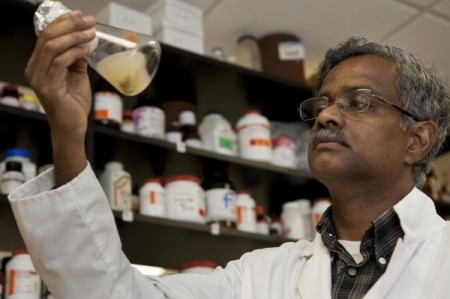

| Online: | |
| Visits: | |
| Stories: |

| Story Views | |
| Now: | |
| Last Hour: | |
| Last 24 Hours: | |
| Total: | |
Progress In Algae Research
Its been a long time since we’ve seen any news in the algae field. University of Florida (UF) researchers may have found a protein key to converting algae to fuel.

Bala Rathinasabapathi, a UF/IFAS professor of horticultural sciences, works in his lab in Gainesville. He and his colleagues may have found a key to converting algae to fuel. Image Credit: UF/IFAS. Click image for the largest view.
The UF Institute of Food and Agricultural Sciences (UF/IFAS) researchers must starve the algae of nitrogen to draw lipids out of algae. Among the hundreds of proteins modulated by nitrogen starvation, the synthesis ROC40 was the most induced when the cells made the most oil.
Finding such information is of great importance for the development of superior strains of algae for biofuel production. The team’s research paper has been published in the Society for Experimental Biology journal The Plant Journal
The scientists have found what researchers call a “transcription factor,” called ROC40.
Bala Rathinasabapathi, a UF/IFAS professor of horticultural sciences, likened a transcription factor’s role in controlling the expression of many genes inside the algae cells to a policeman controlling a large crowd.
Elton Gonçalves, a former UF/IFAS doctoral student in the plant molecular and cellular biology program explained the high induction of the ROC40 protein suggested to scientists that it could be playing an important biological role. In fact, the team’s research showed that ROC40 helps control lipid production when the algal cells were starved of nitrogen.
“Our discovery about the ROC40 protein suggests that it may be increasing the expression of genes involved in the synthesis of oil in microalgae,” Rathinasabapathi said.
Gonçalves said, “Such information is of great importance for the development of superior strains of algae for biofuel production. We conducted this research due to the great socioeconomic importance of developing renewable sources of fuels as alternatives for petroleum-based fuels for future generations. In order to advance the production of algal biofuels into a large-scale, competitive scenario, it is fundamental that the biological processes in these organisms are well understood.”
Rathinasabapathi said this information is valuable for the future for engineering algae so it overproduces oil without starving the algae of nitrogen.
Lipids from microalgae provide an excellent renewable source for biofuels. The algae grow quickly, tolerate extreme weather conditions and do not pose the same issues as biofuel crops that are grown both for fuel and food.
The complication was if algae are deprived of nitrogen, the cells become stressed and begin to produce lipids, but their growth rate slows. And if alga is going to become a commercially viable fuel source, scientists must ensure that not only can it produce as much oil as possible, but also that it can grow as fast as possible.
We’ve been a long time looking for algae news and this press release is very welcome indeed. Its still very basic and will come to introduction through genetic engineering. Algae has been on the list for years and its quite a relief to see there are folks out there making progress!
Source:


